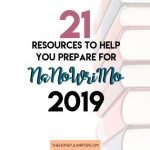People who knew I was a freelance writer thought it was so cool whenever I mentioned it, but I was bored to tears. Or sleep, really.
Every week, I wrote articles about dental procedures, and I would literally fall asleep as I tried to pound it out on the keyboard. I tried to keep going, though, because as a stay-at-home Mom, making money on my own schedule was a dream.
Last year, I finished off with that freelance writing gig feeling like I never wanted to write for someone else again.
I had worked as a freelance writer on and off for about three years, but it wasn’t until a few months of stepping away from freelance writing that I realized I had done it all wrong.
Freelance writing is a great gig for moms; in my opinion, it’s one of the best ways to earn money from home, but there are a few things you can do to avoid burnout.

This post contains affiliate links, which means I could earn a small commission if you use the links. I only recommend a few items or services I love. See my complete disclosure.
1. Pick a Niche that Interests You
Choosing a niche that you find appealing is so essential. You might just be eager to make money and sign up to write about any ol’ thing, but if you are picky about which niche you write in, you’ll last longer and write more quality content.
I worked for three different digital marketing companies as a freelance copywriter. While working for all three companies, I wrote content that wasn’t interesting to me. Two of the companies assigned topics, and I wrote about the same thing week after week. Over and over.
I dreaded working. I often put off my projects until the end of my deadline because I couldn’t get through them without pressure. Writing went quickly because I mostly had to rephrase what I had already written, but it was excruciatingly dull for me. It took all the life out of writing.
You might feel desperate for work at times, but don’t just take what’s available—find a niche you enjoy and learn as much as you can about it. Become knowledgeable enough that you can write quickly without having to write about the same topic every time.
2. Treat Freelance Writing Like Any Other Job
I like the freedom of being a freelancer, but it’s easy to push off your work and let it become a burden. My time to write was during my kids’ naptime, but I often got too tired or distracted because I treated my writing like my dirty dishes: something I could put off until I was desperate.
Set a schedule
Set aside time for your freelance writing and treat it like a job where you’d have to clock in. Figure out what you need to do to write your best and do that as much as you possibly can. What time of day are you most alert? Do you need to be completely free of distractions to write your best content? Where do you prefer to write?
I used to work while both of my kids napped, but that doesn’t happen anymore. Now I do tasks that take the most concentration in the morning before they’re awake or at another time when my husband is home. I do things that don’t require quite as much focus (like research or outlining) while they watch a movie or play around the house.
What kind of schedule would work for you? Are you more of a morning person or a night owl?
Don’t plan other things during your writing time
In my experience, it was also hard to get other people to take my freelance writing job very seriously. If I had set a schedule and taken it seriously myself, I imagine I wouldn’t have gotten asked to do other things during my writing time.
If an emergency comes up, sure, attend to it during your writing time. The joy of working from home is you can run to the doctor if your kid gets sick, or you can go bail out your sister if she’s stranded on the side of the road with an empty tank.
But if someone wants you to babysit or your mother-in-law asks you to help her organize family pictures during that time, you can say no.
Sometimes people think that if you work from home, you have a lot of time on your hands, but that’s definitely the opposite of the truth. You can kindly set them straight and plan to help them out or meet up during a different time.
3. Try Not to Procrastinate
I say “try” not to procrastinate rather than “don’t” because I know that telling a writer never to procrastinate isn’t realistic. One of my professors said, “I don’t procrastinate, I work well with a deadline.”
With that said, try to space out your writing so that you aren’t staying up until 3:00 a.m. the day before a deadline. Writing 20 pages of copywriting in two days is a lot harder than it is in ten days (unless you’re able to write full-time—I wasn’t).
I like to brainstorm, outline, and research before I begin writing. This might seem like an obvious thing to do, or it might be something you never do.
When I first began freelance writing, I just did a little research as I went along; no outline, no brainstorming. This practice made writing take so much longer and was so much harder!
One reason you may procrastinate a writing project is because you’re overwhelmed or unsure of where to stay. Preparing ahead of time can help!
This post is all about pre-writing. It’s specifically about blogs, but it can relate to any type of writing.
4. Leave Time for Editing and Rewriting
If you wait until the last minute to finish your writing, you won’t have time to polish it the way you may want to.
Even the best writers need to edit and rewrite. Spread out your writing enough that you have the time to take another look before turning it in. Turning in polished work will impress clients and leave them wanting more.
I run every blog post, email, Facebook update, and more through Grammarly. I definitely recommend using it to help you perfect your client work. It’s not a perfect tool, but I go into all the nitty-gritty in this blog post so you can use it successfully.
5. Take On What You Can Handle
Our culture seems to think there’s something noble about always being busy and doing more than we can handle. Even though this post may make me sound lazy, I fall victim to this mentality too often.
Be realistic about your situation. How much writing can you handle?
The company I was writing for last year asked me to double the amount I was writing. I have two toddlers (last year my youngest was still a baby), and when I’m not working, my time is packed with taking care of them, cooking, cleaning, or napping because I have poor genetics that make me as sleepy as a newborn.
Taking on more work was too much for me, but I couldn’t bring myself to say no. I wanted to be reliable and thought that by agreeing to take on more work, that’s how the company I worked for would see me.
Taking on double the work led to my burnout. I was still able to create quality work, but each week, I wondered how much longer I would last.
If you control the amount of freelance work you do, try to be realistic about what you can take on. If you’re working for a company as an independent contractor, don’t be afraid to tell them what is realistic for you.
6. Get Support
I had no idea how important support is until I had a ton of it! When I freelanced for digital marketing companies, of course I had the support of my husband and a little bit of “Good job!” from the people I wrote for. But I didn’t realize how much it would mean to me to be a part of a community of freelancers until this year.
I had vowed to never write for anyone else after finishing up my contract with my freelance writing job in 2018, but early in 2019, a friend had me do some writing for him. The writing turned into a little bit of web design, creating PDFs, and more.
Around that time, I started seeing people mention the term “Virtual Assistant” or “VA” a ton. I started reading up on this and discovered I could work on projects that were interesting to me, and I could work with only people I wanted to. My family and I had moved to an apartment where I was working as the manager, and I quickly figured out that wasn’t for me. I learned more and more about freelancing so that I could be successful enough for us to buy our own home.
I found out about Micala Quinn, who taught moms how to run a successful freelance business. Her free Facebook group taught me so much and led me to create my own freelance business, something I hadn’t known was possible. Having that group for support was a great first step.
Over the summer, my husband and I found a townhome that would work perfectly for us, but we could only make it work if I was making more of an income. I had read so many success stories from other people who had joined Micala’s paid program, Overwhelmed to Overbooked, and had agonized for months about whether or not I should jump in and do it. I decided to sign up because I knew I’d need help to launch my business as quickly as possible.
It was hard to press that purchase button because we didn’t have a ton of extra money to spare, but I am so glad I did it. Looking back now, I can honestly say that I would have paid that money just for the support I get from the course Facebook group.
There have been moments when I scoured Indeed and felt like giving up on starting my own freelance business, but having that group of women who know what it’s like being in my situation and who lift me up when I’m feeling unsure has kept me going.
If you’re interested in learning more about what Micala offers, you can check out her free brainstorming guide here and definitely join her free Facebook group! She teaches all kinds of freelancers; even though I focus on freelance writing, I’ve learned a ton about how to run my business.
If you don’t choose to follow Micala, I’d recommend finding some sort of group where you can get a lot of support. Being a freelancer can be an emotional roller coaster but talking with people who will cheer you on is invaluable.
Having support has made a massive difference on my second go-around with freelancing. I probably wouldn’t have kept going without it!
Freelance writing can be an excellent thing for many reasons: you can make great money, have a super flexible schedule, and do work you enjoy. Just make sure you don’t do what I did!
Do you have any other questions about freelance writing? Comment below, and I’ll try to help in any way I can.






